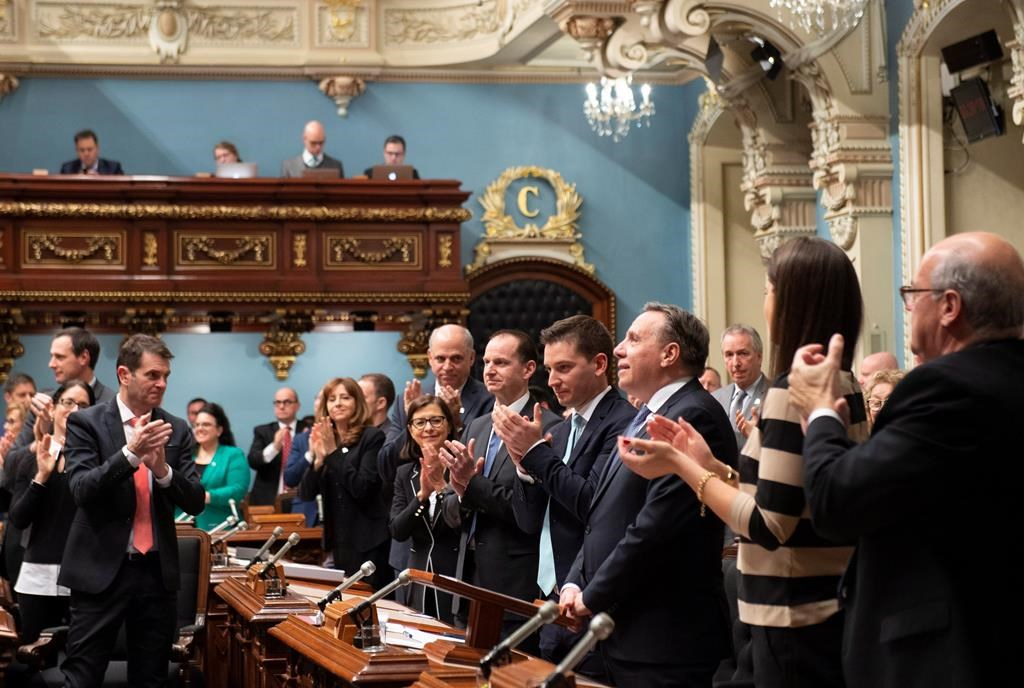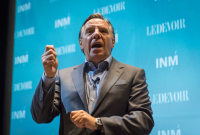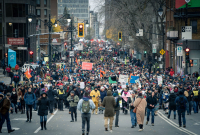Support strong Canadian climate journalism for 2025
Quebec Premier François Legault says his government plans to boldly ramp up his province's action to fight climate change, warning that the entire planet's survival is hanging in the balance.
Legault, whose right-leaning Coalition Avenir Québec party was elected to form a majority government on Oct. 1, 2018, made the comments as he delivered his inaugural address to the National Assembly in Quebec City.
He said Quebec must do a better job of fighting climate change just as it tackles a major economic challenge to match the economic wealth of its neighbouring states and provinces.
"We must, at the same time, take on another challenge: the survival of our planet is at stake," said Legault. "I cannot ignore this urgent climate challenge and continue to look my two sons in the eyes. Being bold, in this area, consists of seeing the reality that we are facing and to roll up our sleeves, despite the colossal magnitude of the challenge in front of us."
Legault says Quebec will remain in an international cap and trade carbon market that it currently shares with California and allows the private sector to set a price on carbon pollution. Ontario Progressive Conservative Premier Doug Ford decided to abandon this market after forming a majority government in his province in June.
Legault also said that his own government would need to do more to reduce emissions, saying that the previous Liberal government, led by former premier Philippe Couillard, hadn't done enough to achieve Quebec's 2020 target that requires the province's annual emissions to be 20 per cent below 1990 levels.
"We found no serious plan from the previous government to achieve the 2020 targets," he said.
Interim Liberal leader Pierre Arcard rebutted this accusation in a press conference held after Legault's address.
"I would like to remind [Legault] that we put forward a transportation electrification plan, an energy transition master plan and a plan to fight climate change," he said. According to him, the 2020 greenhouse gas emissions target "was definitely achievable" at the time the Liberals drew up their climate change plan in late 2011 and early 2012, "but the government needs to continue in that direction."
In 2009, the National Assembly voted unanimously in favour of the 2020 target. But Legault said that it was impossible to find out whether this target was feasible. Quebec is “in the dark” about its current greenhouse gas output, given that the last inventory was in 2015, he said.
He has formed a team to get a better understanding of Quebec's current greenhouse gas levels; its findings will help the government decide the best way to shrink emissions.
"With our electricity, we have the potential to contribute to making the northeastern states become a more competitive and greener region," he said.
To mitigate emissions, Legault said his government would also invest in electrifying the transportation network, including public transit initiatives like the extension of the blue metro line in Montreal and a tramway that links Quebec City’s two shores.
That tramway will only be made possible by the construction of a third link across the river, a project that has been criticized by environmental groups as well as an association that represents Quebec farmers.
Legault said the inclusion of the tramway helps make it a “sustainable development project." He also suggested that critics need to stop automatically opposing new development, without considering the options.
“We need to avoid ideological discussions that claim all construction projects are harmful,” he said
On the campaign trail, the CAQ came under fire for having few promises for environment and climate. On a report card prepared by environmental groups during the election campaign the CAQ scored lowest of Quebec's four main political parties.
About 50,000 people marched in Montreal in early November to protest the lack of attention climate change received during the election campaign, and over 200,000 Quebecers have signed a pledge called The Pact For Transition demanding decisive climate action from the new government in the last three weeks.
But the inaugural speech was possibly geared at changing the CAQ's image when it comes to the environment, with some prominent Quebec environmentalists such as Steven Guilbeault, a co-founder of Équiterre, and Patrick Bonin from Greenpeace, among those invited to attend Legault's address.
The speech was the first major event in the legislature, since the Oct. 1 provincial election, after it reconvened on Tuesday to elect a new speaker.
Manon Massé, the parliamentary leader for Québec solidiare, said late Wednesday afternoon that she found it "disturbing" that Legault had not made the environment one of the main priorities in his address.
"I'm really surprised, especially since the premier had led us to believe that in addition to the three main priorities (economy, education, health) he would add a fourth, which was the environment after meeting with the Pact (for Transition) representatives," she said.

Quebec to become an 'energy superpower'
The cornerstone of Legault's climate strategy is to export “clean, abundant and affordable” energy from Quebec to neighbouring jurisdictions, like states in New England, currently dependent on nuclear energy or fossil fuels like oil and carbon.
Quebec has the potential to become a “energy superpower" and the "battery of the American northeast,” he said.
He added that his government would consider constructing more hydroelectric dams once contracts are signed with Quebec’s neighbours, and that he would consider “competitive” wind projects in the province — but only “when there is need for them."
The premier has openly disavowed support of the Apuiat wind energy project planned for Quebec's North Shore, calling it "useless and ruinous" after Hydro-Quebec CEO Eric Martel said it would incur up to $2 billion in losses for the state utility provider.
Legault added that Quebec is set to reap economic benefits as private investors take advantage of Quebec’s clean energy sources due to mounting global pressure to reduce greenhouse gas emissions.
He also singled out Quebec’s forestry and agricultural industries in an appeal to entrepreneurs to bring their projects to a business-minded government who would help them “advance their investment projects.”
Moving 'very quickly' to ban religious symbols
Legault said that education was his government's “biggest priority,” and that the budget for education would increase throughout his mandate. New teachers will have higher wages and be given a better professional support network.
His government will roll out pre-kindergarden for four-year-olds across Quebec, although these will not be “obligatory” and will complement, not clash, with the province’s pre-existing network of childcare centres.
Religious symbols will be banned for all primary and secondary school teachers alongside employees of the state in positions of authority — “a reasonable position” according to Legault.
“We will be very firm on this, and we plan to move very quickly,” he said.
In terms of the economy, he said his government will redress geographical imbalances in school tax and reform the government’s investment arm, Investissement Quebec, to make it more ambitious and agile.
The government will prioritize immigrants for Quebec’s regions and those who already have a link with a Quebec company. He reiterated his commitment to reduce the number of immigrants accepted each year, adding that this will help the province better integrate the ones they do take in. Quebec currently takes in 50,000 immigrants a year; the CAQ wants to decrease that number to 40,000.
Legault also reiterated his commitment to work with the other parties to draft a law within the first year of the CAQ's mandate that will reform Quebec's electoral system.
with files from The Canadian Press






Comments
Walk the walk, Legault.
If he actually does anything much it would represent an interesting change in the world: From politicians claiming to intend to do something about climate change and then doing nothing, to politicians claiming to intend to do nothing about climate change and then, once elected, treacherously doing something.
Building new dams is not a good idea. It is known now that flooding large areas increases the release of greenhouse gases like methane and other harmful components like mercury that is poisoning fish, wildlife and ultimately people. It also destroys the natural flow of rivers. Building power lines to carry electricity from far away to costumers down south means that you have to clear large swath of forest to support that infrastructure, and spray tons of chemicals to keep plants and trees from growing back.
Reducing consumption of electricity, and energy in general, is a better way to go. Building facilities closer to markets like wind and solar (including solar farms and rooftop solar) reduce the amount of land needed to produce power and make the system more secure, more resilient to weather abnormalities like an ice storm, and other similar events that will become more frequent as climate change disrupts weather patterns.
But in the case of BC and Site C Mr. Horgan...with Mr. Trudeau's blessing has ventured into a 40 billion dollar LNG/Fracking industry that Horgan has deemed the big dam is necessary for industries needs and taxpayers must pay for industries carbon footprint. How long before anarchy comes to Canada? Taxpayers are slowly, but surely becoming wiser.
“...the survival of our planet is at stake.” This type of framing of the risks posed by climate change is faulty. The planet will “survive”; it is the life forms on our planet that are at risk...
I sincerely hope Premier Legault is genuine...he could be a game changer...a “conservative “ politician who accepts the physical science basis of climate change and responds to this challenge with science based policies. The Wishful Thinking of Ministers Trudeau, McKenna, Notley etc will not meet the challenges posed by climate change.
No matter their political stripe, they all smell revenue.